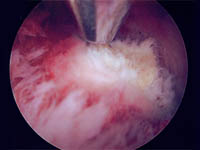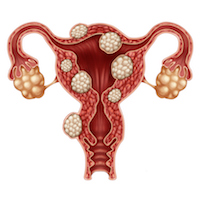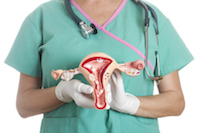LAWSUITS NEWS & LEGAL INFORMATION
Laparoscopic Power Morcellation Legal News Articles & Interviews
Don't Use Ultrasonic Aspirators to Remove Uterine Fibroids FDA States
 October 31, 2017. By Lucy Campbell.
October 31, 2017. By Lucy Campbell.Washington, DC: The US Food and Drug Administration (FDA) has provided the medical community with guidance on the use of ultrasonic surgical aspirators. Specifically, the agency is advising companies that make the devices to label them as contraindicated for the removal of uterine fibroids. The non-binding guidance from the agency serves to strengthen its recent warnings about the use of power morcellators to remove uterine fibroids.
Read [ Don't Use Ultrasonic Aspirators to Remove Uterine Fibroids FDA States ]
Power Morcellation Cancer Warning One Year Too Late for Doctor
 July 10, 2017. By Jane Mundy.
July 10, 2017. By Jane Mundy.:Washington, DC: Dr. Amy Reed, a physician and mother of six had surgery for uterine fibroids with a power morcelletor one year before the FDA first warned about the risk of power morcellators spreading cancer. Dr. Reed died from cancer in May—she was 44 years old.
The power morcellator had scattered malignant cancer cells inside Dr. Reed’s abdomen during surgery, which left her with advanced, Stage 4 cancer. After her surgery, a biopsy found that she had leiomyosarcoma, an aggressive type of cancer, and only then was she and her husband, surgeon Dr. Noorchashm told that a power morcellator was used to slice up her uterus, reported the New York Times (May 24, 2017).
Horrifically ironic, Dr. Reed and Dr. Noorchashm advocated against the power morcellation procedure for four years, which led to the
Incredibly, the power morcellator was approved by the FDA’s 501(k) fast -track process, meaning it didn’t undergo any human clinical trials, despite that agency estimating that 1 in 350 U.S. women who undergo fibroid procedures each year have a form of cancer called uterine sarcoma.
After going public about the power morcellator’s hazards and calling for a complete ban of the device, Dr. Reed and her husband were ostracized both by the hospital where she had the surgery and many gynecologists who favored the device. According to The Times, when Dr. Reed returned to Brigham and Women’s for a medical procedure, she and Dr. Noorchashm “were stunned to find that the hospital had assigned a guard to inspect their bags and escort them at all times, for security reasons. Dr. Noorchashm called a lawyer. A judge put a stop to the escort, issuing a restraining order against the hospital.”
This action by the hospital and the gynecology profession begs the question: are they receiving perks from power morcellation manufacturers? It wouldn’t be the first time that doctors were bribed by drug companies to increase sales, and even sit on their advisory committees…
Olympus Settles Four Power Morcellator Lawsuits
 June 18, 2017. By Deb Hipp.
June 18, 2017. By Deb Hipp.Upper Saucon Township, PA: Olympus Corp. of the Americas has settled four lawsuits for injuries and one death allegedly related to the company's power morcellator surgical device, according to The Morning Call.
Read [ Olympus Settles Four Power Morcellator Lawsuits ]
Ovarian Cancer Survivor Blames Power Morcellator
 May 9, 2017. By Jane Mundy.
May 9, 2017. By Jane Mundy.Power Morcellation Suits Wrap Up but Doctors Still Like Procedure
 April 18, 2017. By Brenda Craig.
April 18, 2017. By Brenda Craig.San Diego, CA The majority of the lawsuits brought by women who developed cancer after a power morcellator procedure to extract uterine fibroids are wrapping up usually via a settlement agreement with Johnson and Johnson.
Charles (Andy) Childers from the firm of Childers, Schlueter & Smith in Atlanta, Georgia says, “We have one wrongful death suit filed against a doctor that is still continuing, however, the other cases we have settled by agreement with Johnson and Johnson.”
Although the outcome of a lawsuit can never bring back what is lost Childers says his clients are “satisfied” with the results.
Power Morcellation (PM) came on board more than twenty years ago and was part of the minimally invasive surgical revolution that allowed doctors to offer patients a more cost effective procedure with quicker recovery times free of the potential complications associated with large incisions and the use of anesthetics.
The technique still in use in the US, involves inserting the power morcellator blade through a tiny incision. The tissue is literally ground and extracted through the same incision.
Power morcellators were commonly used to extract uterine fibroids (myomectomy) or remove the entire uterus. But by 2013 there was trouble on the horizon. As many as 30 lawsuits were filed against Johnson and Johnson alleging that the device unleashed cancerous cells in women with undiagnosed uterine sarcoma.
In November 2014, the FDA issued a safety communication and box label warning that power morcellator had considerable risks. The FDA’s analysis of the data estimated that as many as 1 in 350 women undergoing a hysterectomy or myomectomy for the treatment of fibroids is found to have some kind of
The FDA warned “that uterine tissue may contain unsuspected cancer. The use of laparoscopic power morcellators during fibroid surgery may spread cancer, and decrease the long-term survival of patients.”
Following the FDA communication many doctors retreated from the power morcellation technique.
According to an Italian survey a doctor reported in the Journal of Minimally Invasive Surgery in 2016 that “58.7% of gynecologists declared that they would change their surgical practice after FDA safety communication”. The reason was “only to prevent legal litigation”.
The AAGL, an association of gynecologists and surgeons, still believes there is a role for PM in young pre-menopausal patients with careful patient review prior to PM. At its conference in Vancouver in 2014 an expert panel said that PM can be an effective and safe procedure.
Dr. Marit Lieng, with the Institute of Clinical Medicine at the University of Oslo reported at that time that Oslo University Hospital found 1 cancer per 183 women in 4,765 post or perimenopausal women that underwent surgery at the hospital for uterine fibroids between 2000 and 2013.
The risk of cancerous fibroids in young women is extremely low and therefore Dr. Lieng told the conference, “I think the findings of our study support the conclusions of the AAGL expert group. You can do power morcellation in selected patients, given a thorough preoperative evaluation, including a cervical cytology, endometrial biopsy, and evaluation of the myometrium by ultrasound or MRI, the risk of unintended morcellation of a uterine leiomysosarcoma in premenopausal women appears to be very low.”
The AAGL also expressed interest in finding new more refined ways to do power morcellation in these patients.
In April 2016, the FDA approved for marketing a new version of PM called the Pneumoliner that uses a bag to collect tissue fragments.
The PneumoLiner technique involves inserting the tissue to be removed inside a small plastic bag that is then sealed and inflated to allow a working area for the power morcellator. Despite the fact that the FDA has licensed this for market it is still standing firm on its warning regarding PM procedures.
In April 2016 the FDA wrote that “The PneumoLiner is intended to contain morcellated tissue in the very limited patient population for whom power morcellation may be an appropriate therapeutic option – and only if patients have been appropriately informed of the risks,” said William Maisel, M.D., M.P.H., deputy director for science and chief scientist at the FDA’s Center for Devices and Radiological Health. “This new device does not change our position on the risks associated with power morcellation. We are continuing to warn against the use of power morcellators for the vast majority of women undergoing removal of the uterus or uterine fibroids.”
A study reported in the Journal of Minimally Invasive Surgery, November 2016 found that in 4 out of 12 cases the containment bags being tested in the study ruptured once again exposing patients to the potential risk of tissue dissemination even when using “contained vaginal morcellation”.
Power Morcellators Fast-Tracked Through FDA 510(k) Clearance
 April 16, 2017. By Gordon Gibb.
April 16, 2017. By Gordon Gibb.Washington, DC: As we pass the one-year anniversary of the point when medical device manufacturer Johnson & Johnson (J&J) began settling power morcellation lawsuits, women having undergone treatments for fibroids involving laparoscopic power morcellation are left wondering when, and if the other shoe might drop. This, in the wake of the death, earlier this year of a beloved advocate who championed calls for a ban on power morcellation after her own laparoscopy on February 1, 2012. Bonnie Davis died just shy of five years after her procedure, on January 6 of this year at the age of 57.
Read [ Power Morcellators Fast-Tracked Through FDA 510(k) Clearance ]
Regulatory Concern Mounting Over Power Morcellators, Adverse Events Reports
 February 21, 2017. By Gordon Gibb.
February 21, 2017. By Gordon Gibb.Washington, DC: In a blog posted to the official website of the US Food and Drug Administration (FDA) in October of last year, the regulator’s Director of the Center for Devices and Radiological Health noted that a survey conducted the year prior involving hospitals demonstrated that numerous reports of Ovarian cancer cells spread by power morcellators were not shared with the FDA’s adverse reporting system. An accompanying inspection found that in many cases hospitals had no system in place for staff to submit reports to the FDA or device makers; and that staff did not always know, or were not properly trained with regard to the reporting of injuries and deaths associated with medical devices.
Read [ Regulatory Concern Mounting Over Power Morcellators, Adverse Events Reports ]
Damning Report on FDA Approval of Power Morcellators Released
 February 9, 2017. By Lucy Campbell.
February 9, 2017. By Lucy Campbell.Washington, DC: According to findings from a just-released investigative report, during the past 20 years the US Food and Drug Administration (FDA) has approved 25 surgical devices such as power morcellators, that have the potential to spread undiagnosed cervical cancer in women.
Read [ Damning Report on FDA Approval of Power Morcellators Released ]
Power Morcellator Patient Advocate Dies
 January 19, 2017. By Heidi Turner.
January 19, 2017. By Heidi Turner.Pittsburgh, PA Bonnie Davis, a patient who fought to ensure patients knew about the risks associated with power morcellation has died at age 57 from cancer. Davis had undergone power morcellation in 2012 and was diagnosed six days later with cancer. She worked to raise awareness of the serious risks reportedly linked to the use of power morcellators, to prevent other women from going through what she went through.
Read [ Power Morcellator Patient Advocate Dies ]
Olympus America Attempts a Power Morcellation Comeback
 December 19, 2016. By Gordon Gibb.
December 19, 2016. By Gordon Gibb.Orlando, FL: In spite of a position taken by the US Food and Drug Administration (FDA) that Laparoscopic Uterine Surgery for women Involving power morcellators only be used in relatively rare cases, Olympus America Inc. has released a new power morcellator equipped with a containment bag.
Read [ Olympus America Attempts a Power Morcellation Comeback ]
- Power Morcellators May Be Doing More Harm than Good By Heidi Turner (Nov-15-16)
- Laparoscopic Uterine Surgery for Women Morcellation Lawsuits Continue By Gordon Gibb (Oct-8-16)
- Should Women Still Undergo Power Morcellation? By Heidi Turner (Sep-27-16)
- Proposed Government Bill Aims to Increase Reporting of Defective Medical Devices By Gordon Gibb (Aug-9-16)
- Problems with Power Morcellators Lead to Government Action By Heidi Turner (Jul-8-16)
- FDA Solidly on the Fence over Laparoscopic Uterine Surgery By Gordon Gibb (Jun-8-16)
- FDA Approves New Power Morcellation Device By Heidi Turner (May-8-16)
- Laparoscopic Power Morcellation amongst Most Dangerous Medical Procedures By Gordon Gibb (Apr-3-16)
- Laparoscopic Power Morcellation Lawsuits Expected to Keep Growing By Gordon Gibb (Mar-3-16)
- Officials Ask How FDA Was So Wrong on Risks of Power Morcellation By Heidi Turner (Feb-8-16)
- Power Morcellation Can Free a Hidden Enemy By Gordon Gibb (Jan-11-16)
- Power Morcellator Lawsuits Consolidated; More Lawsuits Filed By Heidi Turner (Dec-15-15)
- Officials Announce Power Morcellation Investigation By Heidi Turner (Nov-12-15)
- Ethicon Laparscopic Power Morcellation Lawsuits Consolidated into MDL By Lucy Campbell (Oct-21-15)
- Power Morcellation at the Center of Yet Another Cancer Lawsuit By Gordon Gibb (Oct-9-15)
- Laparoscopic Device Spreads Uterine Cancer By Brenda Craig (Jan-15-15)
- If Laparoscopic Power Morcellation Is Unsafe, Why Does the FDA Allow It? By Gordon Gibb (Dec-21-14)
- Wrongful Death Suit Filed Over Ethicon Power Morcellation By Lucy Campbell (Dec-15-14)
- Morcellator Gets FDA’s Toughest Warning By Heidi Turner (Nov-28-14)
- FDA Issues Black Box Warning for Laparascopic Power Morecellators By Lucy Campbell (Nov-24-14)
- Laparoscopic Power Morcellator Pulled From the Market By Lucy Campbell (Aug-1-14)
- FDA Advisory Committee Issues Recommendations on Morcellation By Heidi Turner (Jul-27-14)
- FDA Announces Laparoscopic Power Morcellation Advisory Meeting By Lucy Campbell (Jul-11-14)
- Laparoscopic Power Morcellation Hit with First Lawsuit By Gordon Gibb (Jun-5-14)
- Sales of Power Morcellator Suspended Pending Review By Gordon Gibb (May-5-14)
